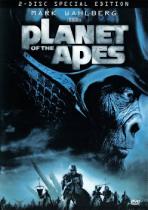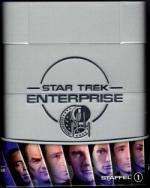Members
Stats
Users Online Users: 0 Users: 0 Guests: 93 Guests: 93 Total: 93 Total: 93 |
Planet of the Apes (Remake), a review by Tom Title: Planet of the Apes  Year: 2001 Director: Tim Burton Rating: PG-13 Length: 120 Min. Video: Anamorphic Widescreen 2.35 Audio: English: Dolby Digital 5.1, English: DTS 5.1, French: Dolby Digital Stereo, Commentary: Dolby Digital Stereo, Commentary: Dolby Digital Stereo Subtitles: English Stars: Mark Wahlberg Tim Roth Helena Bonham Carter Michael Clarke Duncan Paul Giamatti Plot: Get ready for "a wild ride" (The Washington Post) as legendary director Tim Burton's unique vision of the future roars to life in this "amazing display of imagination" (San Francisco Chronicle). In the year 2029, an American astronaut (Mark Wahlberg) crash-lands on a strange planet where talking apes rule over the human race. Now he must evade the advancing gorilla army to reach a sacred temple that my hold the shocking secrets of mankind's past - and the last hope for its salvation! Extras: Commentary DVD-ROM Content Featurettes Multi Angle Music Videos Production Notes Scene Access THX certified Trailers My Thoughts: It has been exactly five years to the day, since I have last watched this movie. I always enjoyed it since I first saw it in the cinema. Great ape make-up!I also did like the ending, which has garnered a lot of criticism. I always thought that it had just the right amount of an "Huh?" effect, which was needed, because, let's be honest, everybody expected some kind of surprise ending like the original Planet of the Apes had. Much of the criticism stems from the fact, that for most people it did not make any sense. But it makes perfect sense to me. In the beginning of the movie, we have three instances, where someone passes the anamoly from the Earth side (I assume, that the space station is in our solar system), and is transported to the other planet (space-travel) and through time. The later someone passes the anamoly, the farther along the timeline this someone arrives. This is why the crew of the space station arrived thousands of years before the main protagonist on that planet (there was probably some time between Mark Wahlberg's travel through the anamoly and that of the stations). And this is why the monkey arrives relatively soon after Wahlberg (a few days maximum) because there was only about a minute between their travels through the anamoly (the monkey went first, therefore arrived later). Now in the end, Wahlberg traveled back. Thade presumable was freed or escaped some time after that, he went to the lake were Wahlbergs pod crashlanded (which Thade knew about), and traveled with this pod through the anamoly. And as he traveled a lot later through it, he arrived long before Wahlberg on Earth. Now of course, we still have to give a lot of creative license into account, that the changed Earth looks a lot like the Earth we know. But I think it is needed for this cliffhanger to work. Rating:  (From Tom's Random Reviews on January 5th, 2009) Mahanagar, a review by AntaresMahanagar (1963) 95/100 - "Not to have seen the cinema of Satyajit Ray means existing in the world without seeing the sun or the moon." - Akira Kurosawa I guess until today, I've never seen the sun or the moon. This is my first film by Satyajit Ray, and while it's only my first, I have to wonder if my favorite director of all time was right. At around the ten minute mark, there's a scene where Arati, who's in bed with her husband, tells him while he's half sleeping, that she will try to find work to help with the family's financial situation. There's a sense of pride in her eyes, and a new found confidence in her demeanor, that you can't help but want to see her succeed. Then, just a few minutes later, Ray shifts the focus to the other end of the emotional spectrum, to a scene where the son tells the father that his daughter-in-law is getting a job. In the span of a brief few minutes, you see the son's embarrassment when he tells his father the news that Arati has found work, juxtaposing it with the guilt and shame that the father feels for being a burden to the family. What makes this scene so powerful is the subtle way that Ray shoots it. The son is off screen, giving his father the news, all the while admitting to his fault at not being able to provide for the whole family. While the son is talking, the camera stays focused on the father's face as Ray slowly and softly, moves into a close up of the father. As the tears start to trickle down the old man's face, you sense a realization that he and his wife are a burden, and have nothing left to offer this world. The pain is painted across his weathered features and he looks down deflated and defeated. In just a few short scenes, Ray runs the gamut from self-confidence, to guilt, to worthlessness. The film really hits its stride when events transpire that put Arati in the role of sole provider for the family. The anguish that the husband feels, coinciding with a simmering jealousy that's boiling just below his emotional surface. Can his pride survive against the progression of time and its changing social structure? In the end, Arati will make a decision which will show her integrity, but may lead to harder times for the family. A somewhat ambiguous ending, but the whole film is done with such craftsmanship that it's pretty close to a work of art. An amazing film that registers so many emotions, on so many levels. I highly recommend this film. What the color coding means... Teal = Masterpiece Dark Green = Classic or someday will be Lime Green = A good, entertaining film Orange = Average Red = Cinemuck Brown = The color of crap, which this film is (From Antares' Short Summations on April 2nd, 2014) Tom's TV Pilots marathon, a review by Tom
Enterprise 1.01+02 Broken Bow Cast: Scott Bakula (Jonathan Archer), John Billingsley (Phlox), Jolene Blalock (T'Pol), Dominic Keating (Malcolm Reed), Anthony Montgomery (Travis Mayweather), Linda Park (Hoshi Sato), Connor Trinneer (Charles "Trip" Tucker III), John Fleck (Silik), Melinda Clarke (Sarin), Tommy 'Tiny' Lister, Jr. (Klaang), Vaughn Armstrong (Admiral Forrest), Jim Beaver (Admiral Daniel Leonard), Mark Moses (Henry Archer), Gary Graham (Ambassador Soval), Thomas Kopache (Tos), Jim Fitzpatrick (Commander Williams), James Horan (Humanoid Figure), Joseph Ruskin (Suliban Doctor), Marty Davis (Young Archer), Van Epperson (Alien Man), Ron King (Farmer), Peter Henry Schroeder (Klingon Chancellor), Matt Williamson (Klingon Council Member), Byron Thames (Crewman), Ricky Luna (Carlos), Jason Grant Smith (Crewman Fletcher), Chelsea Bond (Alien Mother), Ethan Dampf (Alien Child), Diane Klimaszewski (Dancer), Elaine Klimaszewski (Dancer), James Cromwell (Zefram Cochrane (uncredited)) It took a long time, that Enterprise found its footing. Shortly before it was cancelled it became worth watching. All modern Star Trek shows only starting becoming as great as what they are remembered for beginning with their third or fourth season. For Enterprise though this was too late. The pilot is rather weak and not really engaging. Rating:  (From Tom's TV Pilots marathon on July 24th, 2012) |



 May 18, 2024, 04:59:46 AM
May 18, 2024, 04:59:46 AM